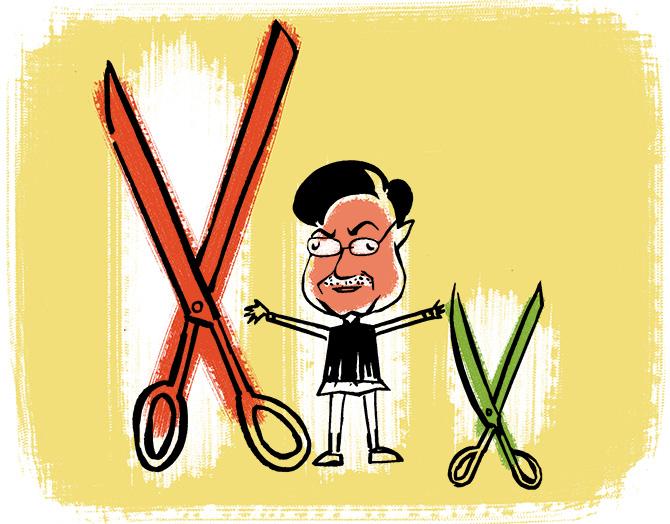CBDT feels 30% growth in income-tax not feasible.
Dilasha Seth reports.
Illustration: Dominic Xavier/Rediff.com

The income-tax department will likely pitch for a reduction in the I-T target for the current fiscal year when the next government presents the Budget, because the previous fiscal year's target was missed.
If unchanged, the department may have to chase a personal I-T collection growth rate of 29%, which is even higher than the 26% growth in 2016-2017 (FY17), the year of demonetisation and the income-declaration schemes, when collections shot up because people regularised their unaccounted income by paying higher levies.
"It makes sense to have a realistic direct tax collection target for 2019-2020. Considering that even the previous year's target has been missed by over Rs 60,000 crore, it will not be feasible to chase a tax growth rate of close to 30% in personal I-T, when the economy is growing at just 11% to 12%," says a government official.
For the current year, a 15% growth rate in direct tax collection, at Rs 13.88 trillion, was projected in the Budget of February 1. However, if growth from the actual numbers is calculated, it comes to 21%.
Similarly, 17% growth is projected for personal I-T collection, but it comes to 29% over the actual collection. The target was pegged at Rs 12 trillion, but the achievement has been Rs 11.38 trillion.
This seems Herculean, given the 11.5% growth in gross domestic product projected at current prices for FY20.
In 2018-2019 (FY19), the department met the corporation tax target despite an increase of Rs 50,000 crore in the revised projection for FY19.
The target for a fiscal year is estimated taking the average of the previous few years. But collection in the demonetisation and income-declaration scheme years -- FY17 and 2017-2018 (FY18) -- should be taken as an aberration, officials argue.
"One cannot expect the collection trend seen in the demonetisation year to continue. Hence, it should be taken as an outlier while doing growth projections. There were new taxpayers and people revised returns, which eventually had to fizzle out," says another official.
Personal I-T saw a growth rate of 26% in FY17 and 18% in FY18. Taxpayers are essentially the salaried and those who run small businesses.
"There are no visible factors that could drive personal I-T growth to a level estimated in the interim Budget," the official says.
In the outlier year, besides increased tax payments due to demonetisation, the government had collected Rs 55,000 crore in the Income Declaration Scheme 2016, paid in three instalments ended September FY18.
Under the scheme, the government had provided an opportunity to black money holders to disclose unaccounted income by paying a tax amount and penalty.
In the previous fiscal year, the tax department had internally pitched for a reduction in the collection target to Rs 11.3 trillion, from Rs 11.5 trillion in the Budget Estimates.
The demand was, however, turned down and the Central Board of Direct Taxes was entrusted with the task of collecting an additional sum to spend on farmer-related welfare schemes.
Four days before the deadline, the CBDT had sent a strongly worded letter to senior I-T officials, asking them to step up efforts amid the possibility of missing the collection target.
In FY18, direct tax collection had exceeded the revised target of Rs 9.8 trillion and reached Rs 9.95 trillion.
In the demonetisation year, self-assessment tax, which can be declared for the previous two fiscal years (2014-2015 and 2015-2016) saw a growth rate of 24%, against 5% in FY19.
The trend suggests many people had tried to regularise their income through the normal accounting route.












 © 2025
© 2025